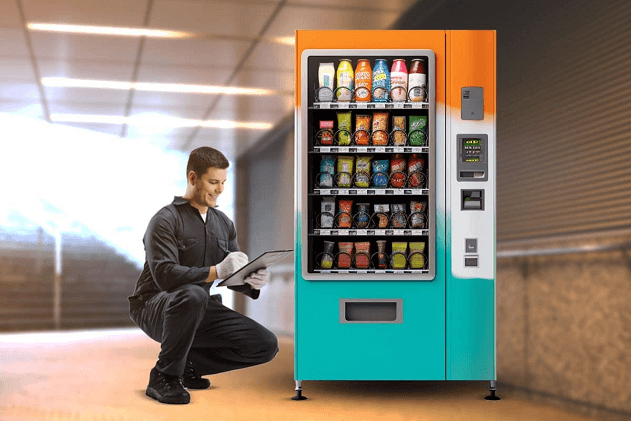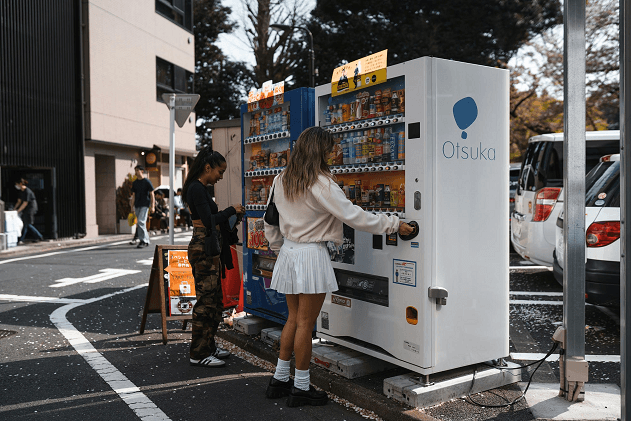How to Start a Vending Machine Business: Your Path to Success and Wealth

The vending machine business is a low-cost, high-potential entrepreneurial venture that appeals to aspiring business owners. With minimal overhead, passive income opportunities, and scalability, vending machines are an excellent way to start building wealth. Many millionaires have launched their journeys by embracing simple yet effective business ideas, including vending machines. In this article, we’ll cover everything you need to know about starting a vending machine business and how it can lead to financial success.
MORE INFO FOR VISIT OUR WEBSITE: kaku press
What Makes the Vending Machine Business Profitable?
The vending machine industry generates billions in revenue annually, with increasing demand for convenience and quick access to snacks, beverages, and essentials. Here’s why it’s so lucrative:
- Low Startup Costs: Starting small requires minimal investment compared to other businesses.
- Passive Income: Machines operate 24/7 without direct supervision.
- Scalability: Expanding involves adding more machines and locations.
- High Demand: People always need snacks, drinks, and convenience items, making this a recession-resistant business.
With proper planning and execution, vending machines can offer a steady stream of passive income that grows over time.
Steps to Start a Vending Machine Business

Research the Market
Before starting, research the vending industry to identify trends, target customers, and high-demand products. Key points to consider include:
- Popular products in your area (e.g., snacks, drinks, or healthy options).
- Competitor analysis to determine underserved locations.
- Trends like cashless payments and smart vending machines.
Create a Business Plan
A well-structured business plan serves as a roadmap for your vending business. Include these elements:
- Goals: Define short-term and long-term objectives.
- Budget: Outline startup costs, operating expenses, and profit projections.
- Locations: Research and secure high-traffic sites.
- Product Selection: Decide on the items you’ll offer based on market demand.
- Marketing Strategy: Plan ways to attract customers and build your brand.
Choose the Right Vending Machines
Selecting the right machines is critical for success. There are three main types to consider:
- Snack and Beverage Machines
- Ideal for high-traffic areas like schools, offices, and gyms.
- Popular choices due to their consistent demand.
- Specialty Machines
- Dispense niche products like personal care items, electronics, or healthy snacks.
- Suitable for unique locations like airports or malls.
- Smart Vending Machines
- Equipped with cashless payment options and inventory tracking.
- Higher upfront cost but improves efficiency and customer experience.
Secure Profitable Locations
Location is the cornerstone of a successful vending machine business. High-traffic areas increase sales and profitability.
Best Locations for Vending Machines:
| Location | Why It’s Profitable |
|---|---|
| Offices | Consistent foot traffic from employees. |
| Schools | High demand for snacks and drinks among students. |
| Gyms | Customers seek healthy snacks and beverages. |
| Hospitals | Visitors and staff need quick access to food. |
| Apartment Complexes | Residents value convenience in shared spaces. |
Calculate Startup Costs
Starting a vending machine business requires an initial investment, but costs can vary depending on scale and machine type.
Breakdown of Startup Costs:
| Expense | Estimated Cost |
|---|---|
| Vending Machines | $1,500 – $10,000 per machine |
| Initial Inventory | $500 – $1,000 |
| Location Rent (if applicable) | $50 – $200/month per machine |
| Maintenance and Repairs | $100/month |
| Licensing and Permits | $100 – $300 |
Start with a modest budget and reinvest profits to grow your business.
Stock Your Machines with High-Demand Products
To maximize profits, offer products that appeal to your target audience.
Popular Vending Machine Items:
- Snacks: Chips, granola bars, and candy.
- Beverages: Bottled water, soda, and energy drinks.
- Healthy Options: Nuts, protein bars, and fruit snacks.
Use sales data to adjust inventory based on customer preferences.
Maintain and Monitor Your Machines
Regular maintenance ensures your machines function properly and attract repeat customers.
Maintenance Tips:
- Restock machines weekly or as needed.
- Clean the machine to maintain a professional appearance.
- Repair issues promptly to avoid revenue loss.
Smart vending machines with inventory tracking simplify restocking and reduce downtime.
How Much Can You Make from a Vending Machine Business?
The income potential depends on factors like location, machine type, and product pricing.
Example of Monthly Revenue:
| Factor | Low-Traffic Location | High-Traffic Location |
|---|---|---|
| Average Sales Per Day | $10 | $50 |
| Total Monthly Sales | $300 | $1,500 |
| Profit Margin (50%) | $150 | $750 |
With multiple machines in high-traffic areas, scaling to thousands of dollars in monthly revenue is achievable.
Success Stories: Millionaires Who Started Small
Many successful entrepreneurs began their journeys with small businesses like vending machines. These examples show how scaling small ventures can lead to millions.
Marcus Graham
Marcus Graham started with just a few vending machines in his hometown. Through strategic placements and reinvestment, he grew his business to over 100 machines, generating over $500,000 annually.
Tamara Johnson
Tamara entered the vending machine industry with a focus on healthy snacks. By targeting gyms and health-conscious locations, she turned her business into a $1 million empire within five years.
These stories prove that with dedication and the right approach, vending machines can lead to financial independence.
FAQs About Starting a Vending Machine Business
1. Do I need a license to start a vending machine business?
Yes, most locations require business licenses and permits for vending machines. Check local regulations before starting.
2. How much does it cost to buy a vending machine?
Vending machines range from $1,500 for basic models to $10,000 for advanced, smart machines.
3. Can I operate a vending machine business part-time?
Yes, vending machines are ideal for part-time entrepreneurs since they generate passive income and require minimal management.
4. How do I find locations for my machines?
Approach property owners and managers with a proposal. Highlight how your machines can benefit their customers or tenants.
5. How profitable is a vending machine business?
Profitability depends on factors like location and product selection. Machines in high-traffic areas can generate $500–$1,500 monthly.
Table: Pros and Cons of Vending Machine Businesses
| Pros | Cons |
|---|---|
| Low startup costs | Location competition can be tough. |
| Passive income potential | Machines require regular maintenance. |
| Scalable with minimal overhead | Inventory management can be time-consuming. |
Chart: Monthly Profit Potential Based on Number of Machines
| Number of Machines | Average Monthly Revenue | Average Monthly Profit |
|---|---|---|
| 3 | $4,500 | $2,250 |
| 10 | $15,000 | $7,500 |
| 20 | $30,000 | $15,000 |
Conclusion: From Vending Machines to Financial Success
Starting a vending machine business is one of the most accessible ways to generate passive income and achieve financial independence. With minimal investment, scalable growth, and consistent demand, this business can provide a reliable foundation for wealth-building.
By researching the market, securing prime locations, and maintaining your machines, you can build a profitable business. Over time, reinvesting your earnings and expanding your operation can transform a modest start into a thriving venture.
Many millionaires started their journeys by mastering small, scalable businesses like vending machines. With dedication, strategy, and persistence, you too can turn this opportunity into a path to financial success.


